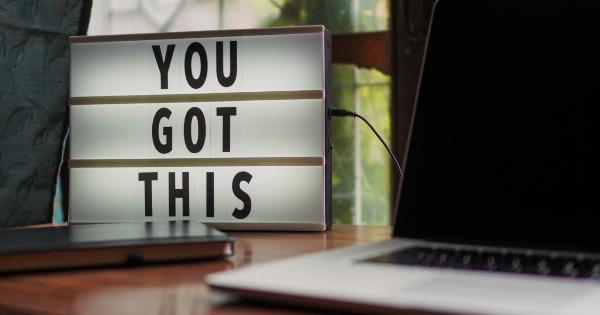Receiving criticism can be a difficult experience for most people. Whether it’s from family, friends, colleagues or even a stranger, negative feedback can be tough to swallow.
However, it’s important to remember that criticism is an opportunity to grow and improve.
Understand that criticism is feedback
The first step in dealing with criticism is to understand that it’s just feedback. Feedback helps us recognize areas where we can improve and grow. Understanding this will help you approach criticism with a more positive mindset.
Criticism is not a personal attack, but merely an indication that there are areas where you can improve.
Listen to the criticism
It’s essential to listen to the criticism being offered. Do not interrupt the person giving criticism and allow them to speak their mind. Listening shows respect and allows you to understand the issue from their perspective.
If you don’t understand, ask questions to clarify their point of view.
Stay Calm
When receiving criticism, it’s essential to stay calm and avoid getting upset or defensive. Take a deep breath and focus on staying calm. Responding emotionally can escalate the situation, making it harder to resolve.
If you feel yourself getting upset, take a break, and continue the conversation later.
Do not take it personally
Always remember that criticism is not a personal attack. Do not take it personally, instead focus on the feedback being offered. This will help you maintain a positive mindset and approach the situation with an open mind.
You can use the criticism to improve, instead of feeling demotivated by it.
Take some time to reflect
After receiving criticism, take some time to reflect on the feedback. Check if there is any truth in it. If the criticism has a valid point, take the opportunity to improve.
However, if you believe the criticism is unfounded and unjustified, don’t dwell on it too much, and move on.
Get feedback from other sources
If you’re not sure about the feedback given to you, get a second opinion from someone you trust. This will help you gain a better understanding of the issue and give you a more objective perspective.
Be willing to learn from your mistakes
It’s essential to be willing to learn from your mistakes. No one is perfect, and everyone makes mistakes. Instead of feeling demotivated, take the opportunity to learn and grow from your mistakes.
Use criticism as an opportunity to improve
Try and shift your mindset from seeing criticism as negative to an opportunity to grow and improve. It’s essential to take the criticism and use it to improve yourself.
Implement the suggested changes and use that to become a better version of yourself.
Don’t dwell on the criticism too long
Although it’s essential to reflect on the criticism, don’t dwell on it for too long. Focusing on the issue for an extended amount of time can lead to negativity and demotivation.
Instead, try to focus on the solutions and ways to improve as quickly as possible.
Conclusion
Dealing with criticism can be tough, but it’s important to remember that it’s an opportunity to grow and improve. Listen to the criticism, stay calm, don’t take it personally, and be willing to learn from your mistakes.
Remember that feedback helps us recognize areas where we can improve, so use it to become a better version of yourself.




























